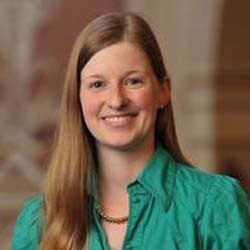
Holly Weiss-Bilka, a second year postdoctoral assistant in the Department of Biological Sciences, has been selected to present at the Association for Clinical and Translational Science’s (ACTS) annual meeting. The conference, Translational Science 2015, will take place in Washington, D.C from April 16th to April 18th, 2015.
Weiss-Bilka, a Notre Dame graduate (B.S. in Aerospace Engineering in ’07, Ph.D. in Bioengineering in ’13) and current member of the Ravosa Lab, researches the skull. She is seeking, as part of the multidisciplinary research team, to develop an understanding of normal skull growth in humans and the responses of bone to external forces.

“The skull is made up of about two dozen bones, connected by structures called ‘sutures,’” Weiss-Bilka explained. “While previous scientific research on the skull has primarily focused on cranial growth at the sutures, very little is known about non-sutural sites, which is where growth and maintenance take place in adults. Moreover, there is a dearth of work comparing the growth and loading responses of bone from multiple skull sites.”
Weiss-Bilka’s talk, entitled, “Not All Osteoblasts Are Created Equal: How Anatomy, Embryology, and Ossification Mode Affect Non-Sutural Osteoblast Behavior in the Developing Skull,” will explore these non-sutural sites. She will present the group’s preliminary findings, which indicate that bone cells, known as osteoblasts, possess distinct characteristics depending on their location in the skull. Weiss-Bilka explained, “When tested in the lab, osteoblasts from the jaw bone produce more bone matrix in a shorter time than osteoblasts from the skullcap. Our findings suggest that these differences are related to variation in the precursor tissues from which cranial bone cells are derived.” Weiss-Bilka continued, “This improved understanding of how bone cells grow, develop, and function could lead to improved therapies for developmental disorders related to bone growth, such as cleft palate.”
The ACTS annual conference seeks to bring together all of the disciplines involved in clinical and translational research for the shared benefits of networking and education. Speaking about her role as a presenter, Matthew Ravosa, Professor of Biological Sciences and Concurrent Professor of both Aerospace and Mechanical Engineering and Anthropology, as well as Dr. Weiss-Bilka’s advisor, commented, “I am delighted that Holly has been selected to present at Translational Science 2015. Ideas for research projects often take time to gestate and develop and in the case of this particular study, it required Dr. Weiss-Bilka’s novel and highly relevant skillset.” Ravosa continued, “I am confident that one day the findings of Dr. Weiss-Bilka and our multidisciplinary team will transform the way in which scientists and clinicians think about the skull, which we hope will lead to more effective, site-specific therapies for developmental disorders and traumatic injuries.”

Weiss-Bilka also commented on the conference, stating, “I am honored to be the first person from Notre Dame to be chosen for an oral presentation at the national ACTS meeting and I look forward to sharing our research with the translational science community.”
Within Notre Dame, clinical and translational science research is supported by the Indiana Clinical and Translational Sciences Institute (CTSI), which is a statewide collaboration between Indiana University, Purdue University, and the University of Notre Dame. For more information on the Indiana CTSI at Notre Dame, including funding opportunities, please see ctsi.nd.edu.
Contact: Holly Weiss-Bilka, holly.e.weiss.31@nd.edu
Originally published by Joanne Fahey at ctsi.nd.edu on March 16, 2015.